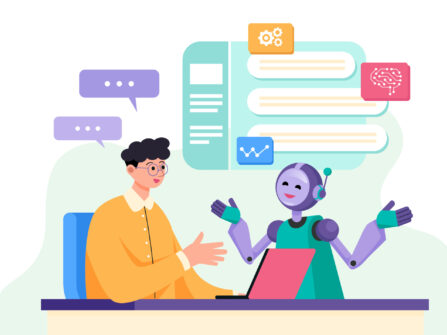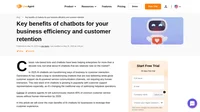With rising customer expectations and personalization needs, it’s hard not to ask how AI can help you. As the initial buzz wanes, humanity discovers how this technology can assist rather than replace people.
In this article, we will examine the practical uses and benefits of artificial intelligence in customer service, offering tips for implementation without alienating customers or employees. We’ll also dispel misconceptions and share inspiring real-life examples.
Table of Contents
- What is AI customer service
- Why is AI being used more and more in customer service?
- Key benefits of AI for your customer support
- Effectively using AI in customer service: LiveAgent's tips
- AI in customer service: closer look from real life
- Is artificial intelligence the future of customer service?
- Still trying to figure out if AI is right for you?
- Conclusion
What is AI customer service
When talking about AI in customer service, chatbots are the first thing that comes to mind, but the implications are much broader. Besides helping offload support channels, AI also automizes repetitive tasks, allowing agents to focus on what truly matters and managers to make data-driven decisions quicker.
The ideal case of AI in customer service
Let’s draft an ideal use case displaying all the opportunities of AI in customer service.
Say hello to Greg. He ran into issues with his shoe order. Arriving at the retailer’s website, Greg is greeted by an AI bot in the bottom right corner and opts to use it.
The chatbot uses positive language and communicates fast. It knows the entire website and uses the information to point Greg to the self-service portal. It may even be connected to the CRM and answer questions about Greg’s exact order, provide personalized experiences and offers, or service Greg in his preferred language.
Now, imagine Greg has a question the bot can’t answer.
At this point, the bot will ask for clarification or will connect Greg to a human agent instead. This way, it won’t get stuck in a loop or answer customer queries miserably, as was often the case in the past.
As the human agent’s conversation with Greg continues, the AI copilot brings up helpful tips and suggestions, aiding the agent in clear writing and looking up relevant information. This way, the agent can be much more efficient, not stopping to consider their tone, check for wordiness, or have to search the knowledge base articles for information. For example, if Greg asks about the return policy, the AI copilot can quickly pull up the relevant details and suggest a concise and relevant response.
The impact of AI on customer service
So, what does this mean for the parties involved? For Greg, it means he gets immediate attention with speedy and polite answers throughout his customer journey, which makes him feel valued and less stressed.
For agents, this means that they won’t waste time answering common questions. Instead, they can focus on helping with complex customer issues and creating relationships.
What about managers? AI can identify patterns and correctly categorize them. Based on this data, it provides valuable insights and predicts customer behavior. For example, it can show Greg is at a risk of churning based on similarities with customers who have churned in the past and provide suggestions to make him stay.
Why is AI being used more and more in customer service?
The biggest reasons for the rise of AI in customer service are heightened customer expectations and the focus on customer retention over acquisition. Excellent customer care is the answer to both, as it is the load-bearing pillar of customer satisfaction and retention. But it’s much easier said than done.
Why add AI to the equation? Let’s look at the data.
72% of customers claim faster service makes them loyal; additionally, 91% of renowned, top companies use AI to boost their customer service.
Especially as your business expands, the question of how to do more with less comes to mind. The answer is using AI to handle repetitive tasks, allowing humans to focus on uniquely human tasks.
AI has been around since the 1960s, but until now, many felt concerns about its reliability and integrity, and rightfully so. But we’re past the very limited chatbots offering terrible answers, getting stuck in loops, and being easily manipulated by users.
As opposed to traditional training based on a fixed set of data, current language models:
- can use real-time learning,
- can adapt to your customer’s needs,
- improve with each customer interaction,
- offer highly advanced security and ethical measures.
Key benefits of AI for your customer support
- Reducing agent burnout: Leaving routine mechanical tasks to machines can make human agents feel more human.
Using AI, agents can check or edit their answers and, therefore, look at the issue from a different perspective, preventing them from feeling like they’re doing the same thing repeatedly.
– Andrej Saxon, head of sales at LiveAgent
- Better training of new employees: AI can give new hires tips and knowledge on demand, help them write, and significantly reduce training time and effort. It can even route tickets to reflect the agent’s current level of expertise, slowly increasing the difficulty.
- Lowering costs: Automating routine tasks and manual processes allows businesses to handle a higher ticket volume without increasing personnel. It is especially beneficial to expanding businesses.
- Providing support 24/7: Timely responses can be a real challenge for businesses with international customers and limited staff. AI excels at this since it can help customers with self-service and create tickets for issues it cannot resolve.
- Speed and consistency: AI will provide instant, consistent, and relevant responses, eliminating human error and letting experienced agents focus on unique cases.
- Offer multilingual support effortlessly: Ways to translate input in real-time have been around for quite a while. However, with the help of natural language understanding (NLU), conversational AI technology brings this possibility to a whole new level, mainly in output accuracy.
- Personalized customer experiences: Humans take longer to analyze data and devise a good plan of action. AI takes just seconds to analyze user preferences and behavior and provide tailored recommendations.
- Data insights: This allows for better data-based decisions. For example, it can highlight customers’ most common issues and suggest solutions.
- Proactive service: AI can monitor information like warranties and customer history to proactively remind customers about subscription renewals or notify them of discounts on products they might like.
Explore LiveAgent’s software for flawless customer service
For smaller businesses, the best course of action is to have their customer service software provider handle both the customer service side and the AI capabilities, not only for ease of use but also for data security and reduced costs.
LiveAgent allows you to integrate proven AI features seamlessly into your human workflows. The AI Assistant, which includes prompt presets, is always ready to help agents craft e-mails at the click of a button. Not only does it help with better writing, but it also creates specific text based on your knowledge base content, acting as an AI copilot.
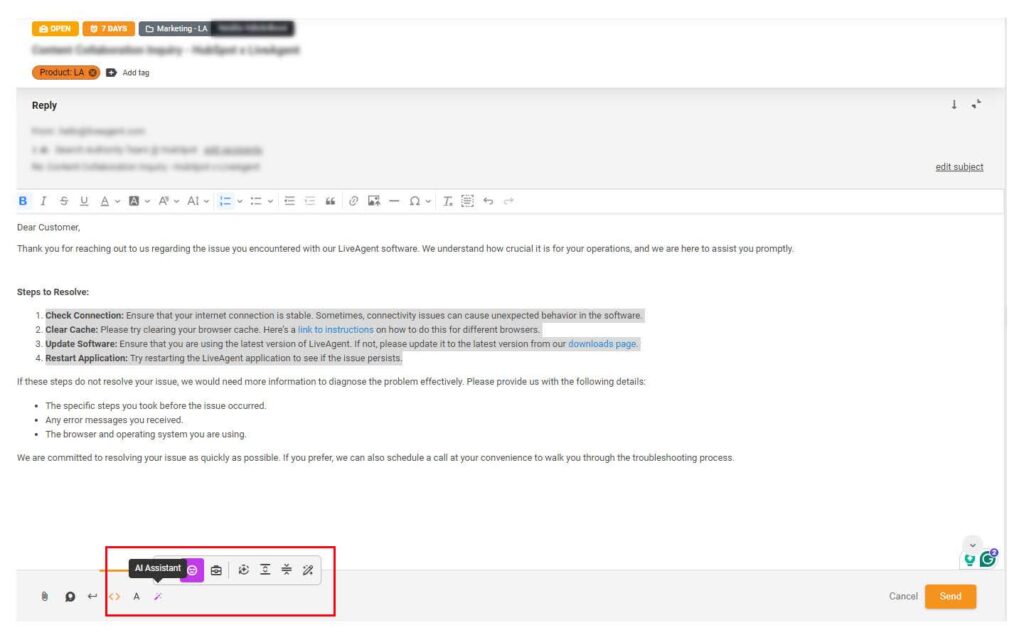
Effectively using AI in customer service: LiveAgent’s tips
Whether you’re looking to develop your own solution or start using AI-powered customer service software, there are some things to consider first.
1: Define clear objectives
AI can be a waste of time and money if it isn’t approached correctly. That’s where setting clear objectives comes into play. Analyze your business goals and only then look for suitable solutions.
What issues are you facing? How can AI help you resolve them?
Simply put, you’ll need a much different solution to improve customer loyalty and engagement than to improve your agents’ response times. AI comes in all shapes and sizes, and there’s no one-size-fits-all solution. Don’t forget to consider the scale and cost efficiency of your solution.
2: Choose and train the right AI tools appropriately
Just like the human agent learns from hands-on experience, an AI system needs appropriate knowledge before starting to help your customers. You’ll need to use the right data and training models to evade dodgy, incorrect, or downright harmful replies.
Doing this yourself from scratch is time-consuming and requires a deep understanding of machine learning, artificial intelligence, and natural language processing. Customer service software providers will usually supply you with pre-trained AI that understands industry-specific issues, tone of voice, and jargon, correctly choosing it based on customer intent.
Granting it access to your knowledge base, website, and CRM will allow it to provide specific and accurate responses. For example, the URLsLab chatbot will provide you with a no-code solution, allowing you to control the models and training of your chatbot via a user-friendly platform.
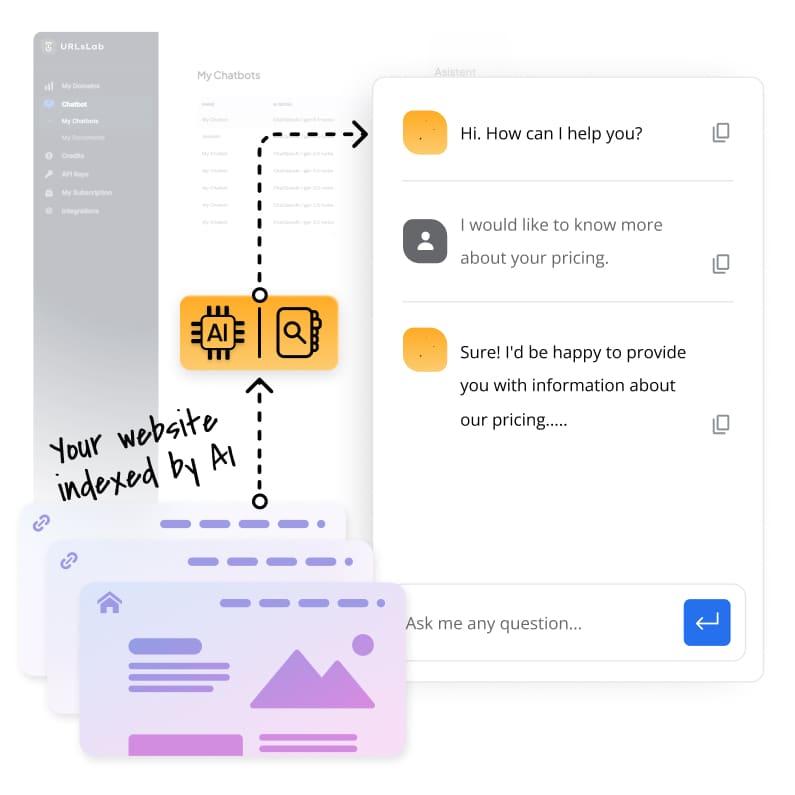
3: Handle sensitive data securely and integrate ethical AI guidelines
Your customers will inevitably share personal data with the chatbot. No matter the nature of your business, you will, at the very least, be handling addresses and full names. Whether by error, negligence, or deliberate chatbot attacks, not keeping your customer data secure can get pricey.
Consult your provider’s policies, security methods, and what they share with other parties. You need to be upfront with your customers about the data it collects and provide a clear option to give or withdraw consent.
To deter opportunistic bad actors, implement end-to-end encryption and consider using authentication and authorization before allowing visitors to interact with the chatbot. You can also create several chatbot iterations, each coming with a different level of knowledge and competencies. For example, using a different chatbot for visitors and logged-in users.
Integrate ethical AI guidelines.
Do you remember the scandals with chatbots spouting slurs they learned from malicious users?
You wouldn’t want your chatbot to call customers names because of a few bad apples. That’s precisely why these guidelines are in place. AI developers are putting a lot of effort into ensuring AI is respectful, appropriate, and non-discriminatory.
You also must have read the “I’m sorry, but as an AI language model, I cannot…” sentence, whether in a reply from ChatGPT, a lazy student’s essay, or a badly generated spam message. AI is now equipped with fallback methods, such as these predefined answers, that make sure it does not go on to give false and harmful information with authority. Further predefined answers and behaviors can be added to fit your use case.
4: Enable self-service options and multichannel support
Customers will often contact support simply because they are in a hurry or prefer to talk things over research. According to CMSWire, guiding your customers to successful self-service is the greatest benefit CX leaders see in AI. By gathering data from your website and knowledge base, AI can become an expert on your business in minutes. It will look up and link the relevant knowledge base article faster than a human could.
AI-powered Chatbots on your website are just a part of the solution. AI can help with most, if not all, of your customer service channels. Comprehensive solutions, such as LiveAgent, will allow you to streamline your communication in one dashboard, letting AI help answer tickets from any source, including e-mail, WhatsApp, or Slack.
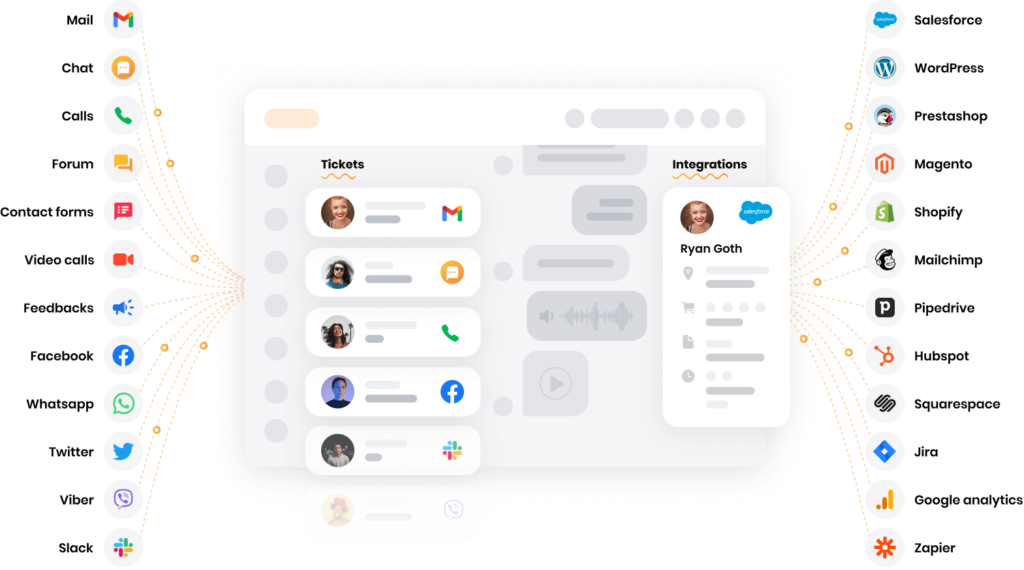
5: Keep communication transparent
Be open with your customers about when they interact with an AI agent, to what extent your contact center is AI-powered, and what precautions you take to keep their data safe.
Transparent communication builds trust and sets reasonable customer expectations.
Moreover, if you use AI algorithms to make decisions that directly affect your customers, let them know. But most of all, if AI fails, be prepared to take full accountability, promptly communicating what went wrong and what you’re doing to fix it.
6: Focus on long-term optimization and collaborative human-AI workflows
AI only knows what we teach it and only thinks how we tell it to. No matter how great your solution is, it will still require constant human oversight, tweaking, and measuring to reach its full potential. Don’t forget that AI is a good servant but a lousy master. It can get lost in complex tasks and can’t show genuine emotion. The more prevalent AI becomes, the more you hear about enhancing it with a “human touch.” Let it continuously learn from experience by utilizing real-time machine learning.
Unlike classic machine learning, in which data scientists provide the model with historical data, real-time learning happens with live data as it passes through. It’s excellent when AI needs to adapt to changing customer behavior, a more significant number of new products, or when there’s not enough data to train it reliably. As with every new strategy, don’t forget to do A/B testing continuously.
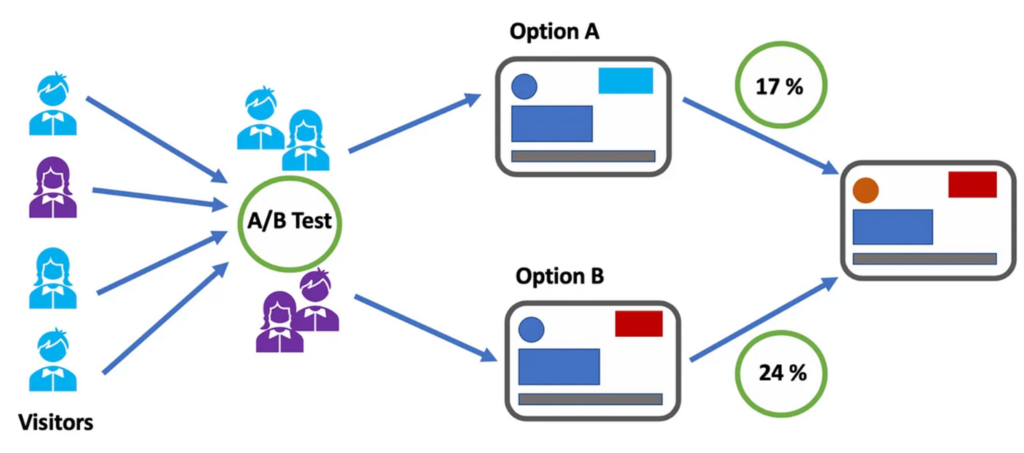
Furthermore, keep in mind AI-automated workflows. They are not about replacing human agents but empowering them to be more thoughtful about their jobs and perform tasks faster. Prioritize a human-first approach and communicate this to all team members.
7: Enhance proactive engagement and do not underestimate feedback
With the proper training and access to data, AI can take a proactive approach, giving personalized responses based on customers’ preferences, behavior, and more. This way, chatbots can take on the role of salespeople, helping customers take the final steps, offering discounts, or proactively reaching out. For example, when a customer spends considerable time looking at a product, the chatbot can check to see if they have any questions.
Plus, feedback will forever be the best gauge of customer service success. While metrics help you understand customers, feedback is customers speaking their minds openly, eliminating the guesswork.
Human or machine, both can and should learn from feedback.
Certain missteps, such as incompletely trained chatbots or inadequate access to human agents, can damage customer relationships en masse. Listen and act on feedback to stay on top and keep optimizing your AI solutions to reach the sweet spot.
8: Keep fallback strategies
Some companies make the mistake of expecting AI to solve all their problems with the flick of a finger. For example, they relay all their customer support to an incompletely trained AI chatbot with no human intervention or oversight. This leads to unrealistic expectations and disastrous results.
When a chatbot cannot understand or answer a ticket, the best option is to escalate the issue to a human agent. If no human agent is available, AI can be programmed to resort to default responses, such as asking for customer request clarification or letting them know a ticket has been created and someone will attend to them shortly.
9: Leverage predictive analytics
The most widespread use case of predictive analysis in customer service is personalization at scale. A great example of this is the personalized recommendations from streaming apps like Netflix. Using data from past customer interactions, algorithms predict your future interests, creating a personalized experience.
Another key use is pinpointing common issues and space for improvement. Imagine you’re battling a supply chain outage affecting a particular region. Seeing the influx of late delivery complaints, AI can point out all the other orders likely to be affected. The AI-powered insights allow you to predict the potential issue and communicate in advance, lowering the volume of future tickets.
Lastly, your customer service team will benefit from predictive analytics, too. AI can analyze historical customer demand and agent capacity. This way, it can anticipate high and low-demand periods, suggest suitable resource allocation, and ensure you’re always staffed just right to handle difficult times.
AI in customer service: closer look from real life
We’ve covered various aspects of AI and drafted the practical uses in customer service. Now, let’s look at real-life examples of how top brands use AI to reach customer service excellence.
AI chatbots done right
Thinking of chatbots helping humans, your mind naturally drifts to customer service professionals sitting at their computers, but Macy’s is doing something brand new. Department store staff can get stressed between helping customers, stocking up, and cashing out, because of this, sometimes it’s hard to find in-store assistance.
Owners of the Macy’s app get to use a unique feature. An AI chatbot will gladly assist them in finding items, consulting policies, and more. If an associate is needed, AI will help you locate one, just like it would forward your message to a human support agent.
Another physical example is how Domino’s bot, aptly named Dom, automates ordering via Facebook Messenger. This allows the staff to get accurate order information and focus on uniquely human tasks. Dom can then track orders and inform customers of the progress.
Shaping the future with predictive analytics
Remember the use of predictive analytics to anticipate customer churn? But what data should be used for the predictions? The bank giant American Express analyzes historical transaction data to indicate the likelihood of customers closing their accounts. Armed with this information, they proactively reach out to improve customer relationships.
You know the frustration of eyeing a product, and just when you’re ready to purchase, the product is already sold out? It’s less likely to happen if you’re shopping at Zara. They use predictive analysis to manage their inventory. Analyzing historical data, current fashion trends, and regional preferences, Zara ensures that each store always has the right products.
Understanding Customers
AI helps understand customers both at scale and in individual cases. L’Oreal uses the Clarabridge platform to analyze hundreds of tickets, using feedback from various channels to pinpoint overall customer sentiment and key themes. The findings then drive L’Oreal’s decisions. On the other hand, Uber uses sentiment analysis to decipher the sentiment of individual messages immediately. This helps them categorize tickets and attend to distressed customers first.
Is artificial intelligence the future of customer service?
We’re currently living through the AI boom. It seems like AI is everywhere, but it’s still a relatively new technology. Even the top brands are still figuring out the possibilities and mitigating shortcomings.
As a dynamic field where speed and accuracy of replies are crucial, customer service is expected to remain the most popular use case of artificial intelligence, with chatbots predicted to be the primary customer service channel by 2027. Further uses are expected to emerge and keep advancing. Truly human-sounding AI virtual assistants are expected to be the next big thing, revolutionizing the boring interactive voice response.
But it’s important to understand that it’s not about getting rid of workers but making them smarter. In an article written for the MIT Sloan Management Review, P.V. Kannan and Josh Bernoff say the future of customer service is in machine-human collaboration. “When machines handle routine inquiries, customers are happier. And when service staff can concentrate on more complex questions — or on answering questions with a bot making suggestions — they can deliver far better service,” they said.
Still trying to figure out if AI is right for you?
Some businesses have been using AI-powered tools in support for years, while others were prompted to adopt them by the recent AI boom. In either case, they had to battle some common concerns and misconceptions. You, too, might be asking yourself these questions.
Will AI understand my customers?
Yes. AI capabilities have advanced significantly, thanks to large language models and deep learning. LiveAgent AI Chatbot uses this technology to understand customer intent and respond appropriately. To keep it sharp, it’s important to update the system regularly based on real interactions and feedback. And if the AI can’t solve an issue, LiveAgent offers built-in fallback options to transfer tickets to human agents smoothly. LiveAgent offers a free trial, so you can test LiveAgent AI Chatbot in your own environment and see first-hand how it improves efficiency and cuts costs.
Additionally, set up fallback methods to transfer tickets to human agents if the bot cannot provide an answer. By following these steps, you can enhance your AI’s performance and reliability in customer service.
What if my support will lack a human touch?
By now, AI can mimic human speech patterns and emotions effectively and often sounds more positive and brighter than unenthusiastic human agents. It’s paramount to clearly inform customers when they are talking to an AI and when to a human. Passing AI bots off as humans is deceitful, and customers will not appreciate it.
Some customers will always prefer human interaction, especially in emotionally charged situations. Make sure a human customer service agent is always available.
How do I help my team transition?
As with any large-scale change, switching to an AI workflow will require hard work and determination. Some workers may fear job loss, so it’s crucial for managers to reassure them that AI is there to assist, not replace, the team.
Emphasize the value of human skills that will remain essential or become more important. Offer training and seminars to ease the transition. Motivate customer reps to improve. But most importantly, start small.
Is it safe for my customers to share data with a chatbot?
Safety in AI depends on deployment, data collection, and usage. However, the education of customers and service professionals is crucial. Be aware of how your AI processes data, use encryption and other safety methods, and communicate safety protocols clearly to customers and employees.
How much does implementing AI cost?
If you’re considering AI to reduce costs or avoid future expenses, it’s essential to be realistic about your needs and budget.
Small businesses will want to trust their customer service software to handle the development, but remember, there will be costs for AI services and employee training. The good news is that upfront costs will be covered in the long run.
Conclusion
It’s easy to imagine how AI can be at the heart of every customer service. While it still has limitations, we have undoubtedly entered a new age where not using AI often means robbing yourself of satisfied customers and faster and happier agents.
If you’re still unsure and find the world of AI confusing, start small with trusted customer service software. LiveAgent AI Chatbot takes the best of AI without alienating humans: no overblown costs or extravagantly complicated solutions. On top of that, you get to try an AI chatbot for free for 30 days!
Enhance your workflow
Make space for your agents to focus on what really matters. Find out how AI can help you and your customers.
Frequently Asked Questions
Will customer service agents be replaced with AI?
Absolutely not. As with any technical revolution, AI will make some positions obsolete or decrease the need for new hires. When simple tasks are taken over by AI, qualified workers who know how to use AI to their advantage while adding a human touch will become even more indispensable.
What are the limitations of AI in customer service?
AI is a machine that only simulates human language and intelligence. It cannot have entirely original thoughts and is incapable of emotion. If not trained adequately or programmed correctly, it fails to do its tasks accurately. Human oversight is a must.
What are the costs associated with implementing AI in customer service?
It all depends on your solution and related expenditures on training or hiring qualified employees. Most AI customer service solutions providers will charge pay-as-you-go fees based on your usage volume, purpose, and AI model choice.
Can AI systems handle complex customer service scenarios that require empathy and understanding?
They are certainly trained to and can provide answers in such scenarios. However, some customers will feel disrespected by the machine’s learned empathy and will require speaking to a human agent instead. It’s one of the reasons why having a human agent available at all times is non-negotiable.
Share this article
Smart customer satisfaction software
Boost customer satisfaction in 2025 with LiveAgent! Deliver personalized, 24/7 support on every channel. Free trial, no credit card needed.
Key benefits of chatbots for your business efficiency and customer retention
Discover the top benefits of chatbots: boost efficiency, cut costs, and deliver 24/7 customer support. See real business use cases!

 Български
Български  Čeština
Čeština  Dansk
Dansk  Deutsch
Deutsch  Eesti
Eesti  Español
Español  Français
Français  Ελληνικα
Ελληνικα  Hrvatski
Hrvatski  Italiano
Italiano  Latviešu
Latviešu  Lietuviškai
Lietuviškai  Magyar
Magyar  Nederlands
Nederlands  Norsk bokmål
Norsk bokmål  Polski
Polski  Română
Română  Русский
Русский  Slovenčina
Slovenčina  Slovenščina
Slovenščina  简体中文
简体中文  Tagalog
Tagalog  Tiếng Việt
Tiếng Việt  العربية
العربية  Português
Português 